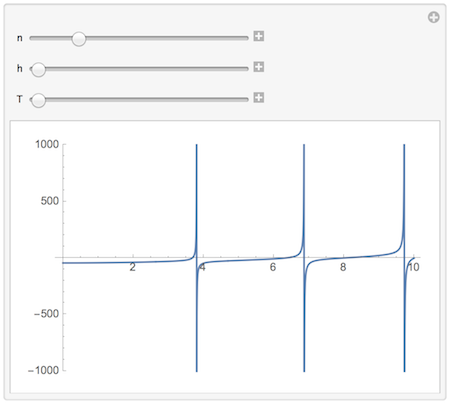I'm new in Mathematica and I'm trying to find the solutions of this equation involving Bessel functions
$$\eta \frac{ J_{n+1}(\eta a)}{J_n(\eta a)}+\chi \frac{ I_{n+1}(\chi a)}{I_n(\chi a)}=0$$
where,
$$ \eta =\sqrt{\frac{\beta ^2 \left(\sqrt{\frac{4 \alpha ^2 \omega ^2}{\beta ^2}+1}-1\right)}{2 \alpha ^2}} \,\,\,,\,\,\,\,\,\chi =\sqrt{\frac{\beta ^2 \left(\sqrt{\frac{4 \alpha ^2 \omega ^2}{\beta ^2}+1}+1\right)}{2 \alpha ^2}}$$
and
$$ \alpha =\sqrt{\frac{h^2 M}{12 \left(1-\nu ^2\right) \rho }} \,\,,\,\,\, \beta =\sqrt{\frac{M T}{\left(1-\nu ^2\right) \rho }}$$
So at the end, my equation is a function of n (which is an integer), $\omega$, h and T.
I need to find the values of $\omega$ or eigenfrequencies for which the equation is satisfied.
Based on this post Trying to solve a transcendental equation involving Bessel functions, I tried the following:
f[n_, ω_, h_,T_] := η*BesselJ[n+1,η*a]/BesselJ[n,η*a]
+ χ*BesselI[n+1, χ*a]/BesselI[n,χ*a]
and
Manipulate[Plot[f[n_, ω_, h_, T_], {ω, 0, 10}, PlotRange -> {-1000, 1000}],
{n, 0, 5, 1}, {h, 0.1, 1}, {T, -1, 1}]
but the plot does not show anything. (I set a=1)
Thanks for your help!

